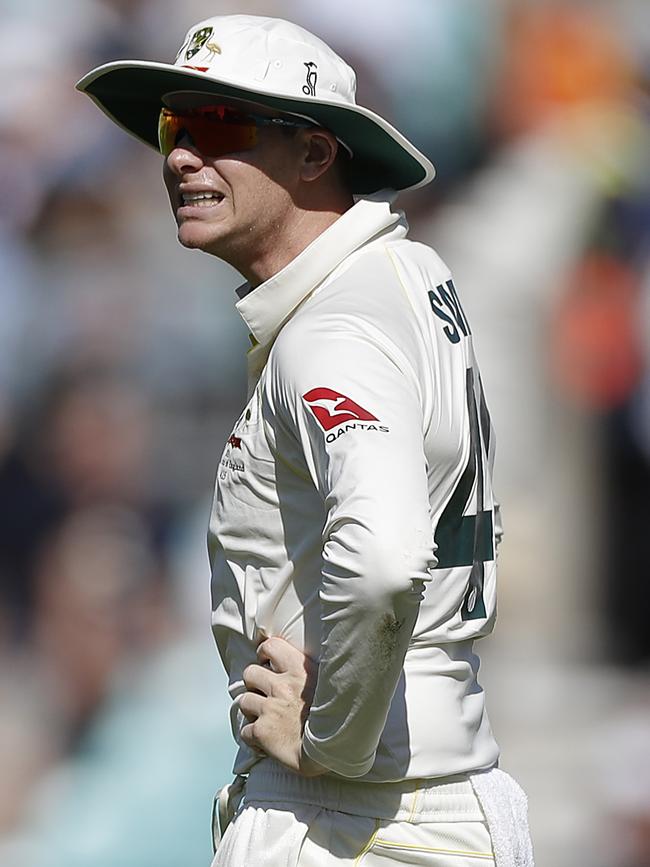
England’s captain clung on for a while, the waters lapping and the sharks circling. For a little over three-and-a-half hours he manned the raft, confidently at first, with his footwork in as good a working order as it has been all series, but then less at ease and requiring three dropped catches to stay afloat, until eventually the winds became too strong, the waters too rough and he was capsized by the world’s best fast bowler, Pat Cummins.
Cummins rocked back Root’s off stump again, just as he had first ball on the fourth evening at Old Trafford, a wicket that went a long way to securing the Ashes. It is open to debate whether the captaincy is having an effect on Root’s batting, but what is not in question is just how well Josh Hazlewood and Cummins in particular have bowled to him this series, pinning him to the crease, causing glitches in his hitherto smooth footwork with their pace and relentless accuracy, so preventing him from turning pretty little fifties into matchwinning hundreds.
They call Cummins “Winx” after the champion racehorse down under and, along with Steve Smith, he has been the best of Australia this summer, strong, combative, enduring and full of pedigree. He had Root dropped twice in the opening session, at fine leg on 24 by Peter Siddle, and one run and one over later by Tim Paine — both were bad misses — and so he will feel he deserved the wicket of the England captain, which finally came four overs after tea.

Root, who went past 7000 Test runs on the way, had also been dropped by Steve Smith off Siddle shortly after lunch, so he could not complain that luck had deserted him, and it was in keeping with Australia’s slapdash day. Later, Cummins overstepped the front line having had Sam Curran given out leg-before, although on his first Ashes appearance, Curran could no more make the most of his luck than Root. What the dropped catches meant was that the main bowlers had tired by the time Jos Buttler got going in the final hour of the day to improve England’s position.
It went like this: Paine, for some reason, decided to bowl first on a pitch that was grassy but deceptively so and very dry underneath. Mitchell Marsh came into the side, which worked given that he produced his Test-best figures, as did Siddle, which didn’t. Marsh, the 27-year-old all-rounder, swung the ball lavishly at times and took four wickets before leaving the field with cramp, while Siddle bowled with uncharacteristic waywardness.
From 2-130, which is where they were at the start of the 39th over, England declined to a depressing 8-226, when Jack Leach joined Buttler at the crease.
England’s batting until the Somerset pair reprised their under-13 days together and had some fun, adding 45 runs in the final dozen overs had, typically, failed to take advantage of Australia’s generosity.
Joe Denly and Rory Burns had put on the biggest opening partnership of the series from either side, the grand total of 27 runs, when Denly’s eyes lit up once too often to an inviting ball outside off stump.
Burns, looking better and better as the series has progressed, played beautifully, driving and clipping compactly, until he spliced a pull shot, and Ben Stokes fell the same way, the catch coming off edge rather than splice. Australia’s errors, by this point, were manifold and opportunity beckoned for England.
Then, enjoying a helpful cross-breeze and the lush outfield, which maintained a suitable shine on the ball, Marsh cajoled more swing than we have seen from any bowler all series.
He set up Jonny Bairstow beautifully, pulling the batsman across his crease with a number of outswingers, before darting one back to get an lbw. Then, in consecutive overs, he found Curran’s edge, to end hopes of a cameo that had begun with a pulled six off Cummins, and beat Chris Woakes, with a full, dipping, inswinger.
At this stage, David Warner at slip began to visualise his innings — or the spectre of Stuart Broad — to come.
Cummins and Hazlewood were carrying a heavy load because Siddle’s rhythm was absent all day, and because Nathan Lyon, who has gradually been nullified as the series has progressed, was limited to four serviceable overs. By this stage, Paine must have wondered why he had not persevered with Mitchell Starc, who, after all, had played in the winning side at Old Trafford as, no doubt, did Lyon, given the help a left-armer (and bowling last) would provide.
Cue Buttler, who gave eventual notice of his bellicose intentions in the 73rd over, shortly after Leach had replaced Jofra Archer, when he hit Hazlewood for huge consecutive sixes down the ground, freed at last from constraints. When he aimed one of those trademarked one-day scoop shots, we knew we were in a for an exuberant end to the day. Paine now spread the field, hoping to get the tailender on strike, but was frustrated by Leach’s solid defence — he really does look as technically accomplished as some of his top-order colleagues — and Buttler’s inventiveness.
Buttler’s half-century — 60 balls, five fours and three sixes — arrived with a mighty pulled six into the crowd off Hazlewood, and a reverse-sweep off Marnus Labuschagne went to the boundary at backward point with such ferocity that Buttler’s sketchy form hitherto began to fade from memory.
The new ball was taken just before the end of the day, to no effect, other than Hazlewood sending a crashing blow to Leach’s forearm guard. The end came with the spectators short-changed to the tune of eight overs, despite the extra half hour of play.
What cricket they did see was enjoyable enough in its error-strewn way. Australia picked the wrong team, made a poor choice at the toss, dropped three catches, overstepped the front line, but enjoyed periods of excellence in between.
England? Despite all those advantages, they still looked like falling well short of 300, until Buttler unleashed late in the day.
Quite who had the best of it is hard to call, although both teams, against the history of this great competition, were uncommonly generous to each other throughout.
The Times




Australians are rarely as giving as this. The sight of a struggling England captain, under scrutiny for his form, his ability to lead from the front and inspire, usually brings out their predatory and ruthless nature, but on the first day at the Oval they were anything but. Generous in selection, at the toss, with their catching and no balls, they offered Joe Root a lifeboat in his hour of need.